
Vittorio De Sica was an Italian film director and actor, a leading figure in the neorealist movement.
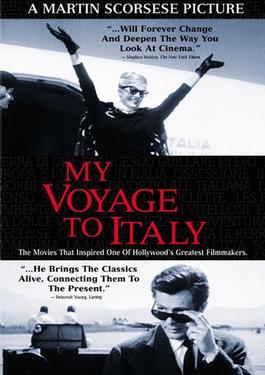
My Voyage to Italy is a personal documentary by acclaimed Italian-American director Martin Scorsese. The film is a voyage through Italian cinema history, marking influential films for Scorsese and particularly covering the Italian neorealism period.

Maria Luisa Attanasio, known by her stage name Carla Del Poggio, was an Italian cinema, theatre, and television actress. A native of Naples, she was the wife of Italian director Alberto Lattuada for 60 years, from 2 April 1945 until his death 3 July 2005. She died at the age of 84 from undisclosed causes.

Telefoni Bianchi films, also called deco films, were made by the Italian film industry in the 1930s and the 1940s in imitation of American comedies of the time in a sharp contrast to the other important style of the era, calligrafismo, which was highly artistic. The cinema of Telefoni Bianchi was born from the success of the Italian film comedy of the early 1930s; it was a lighter version, cleansed of any intellectualism or veiled social criticism.

Irasema Dilián was an actress. Born in Brazil to Polish parents, she began her film career in Italy, and appeared in Italian, Spanish and Mexican films.
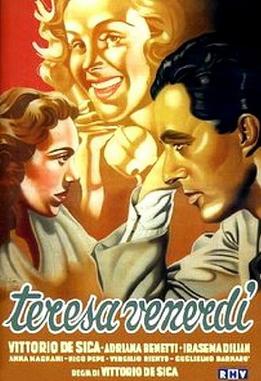
Teresa Venerdì is a 1941 Italian "white-telephones" comedy film directed by Vittorio De Sica. It is a remake of the Hungarian film Rézi Friday.

The Gold of Naples is a 1954 Italian anthology film directed by Vittorio De Sica. It was entered into the 1955 Cannes Film Festival. In 2008, the film was included on the Italian Ministry of Cultural Heritage’s 100 Italian films to be saved, a list of 100 films that "have changed the collective memory of the country between 1942 and 1978."
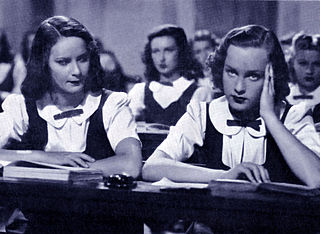
Schoolgirl Diary is a 1941 Italian "white-telephones" drama film directed by Mario Mattoli and starring Alida Valli.

Guglielmo Barnabò was an Italian stage and film actor. He appeared in more than 90 films between 1926 and 1954.
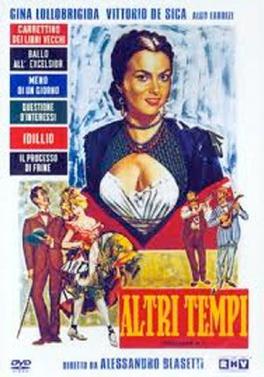
In Olden Days is a 1952 Italian comedy drama anthology film directed by Alessandro Blasetti and featuring an ensemble cast that included Gina Lollobrigida, Amedeo Nazzari, Vittorio De Sica, Elisa Cegani, Barbara Florian, Aldo Fabrizi, Andrea Checchi and Alba Arnova. It was shot at the Cinecittà Studios in Rome. The film's sets were designed by the art directors Dario Cecchi and Veniero Colasanti. It is also known as Times Gone By and Infidelity.
Red Roses is a 1940 Italian "white-telephones" comedy film directed by Vittorio De Sica and Giuseppe Amato and starring De Sica, Renée Saint-Cyr, and Vivi Gioi. It was De Sica's first film as a director. De Sica had previously appeared in a 1936 production of the stage play by Aldo De Benedetti on which it was based. It was shot at the Cinecitta Studios in Rome. The film's sets were designed by the art director Gastone Medin.

Annabella Incontrera, sometimes credited as Pam Stevenson, was an Italian film and television actress.
Naples of Olden Times is a 1938 Italian musical comedy film directed by Amleto Palermi and starring Vittorio De Sica, Emma Gramatica and Elisa Cegani. It was made at Cinecittà in Rome.

Seconda B is a 1934 Italian comedy film directed by Goffredo Alessandrini and starring Sergio Tofano, Dina Perbellini and María Denis. It was screened at the Venice Film Festival where it was awarded a prize. It started a trend for "schoolgirl comedies" during the Fascist era, targeted primarily at girls and young women audiences. The title itself refers to a school class. The film is set in the early 1910s.

Alessandro D'Alatri was an Italian film director, screenwriter and actor. He started a career as an actor, and later he enrolled at as a successful career as a film and television director.

It Always Ends That Way is a 1939 Italian musical comedy film directed by Enrique Susini and starring Vittorio De Sica, Nedda Francy and Roberto Rey. The film was based on a novel by Robert Dieudonné. It was shot at the Cinecittà studios in Rome with sets designed by Salvo D'Angelo.
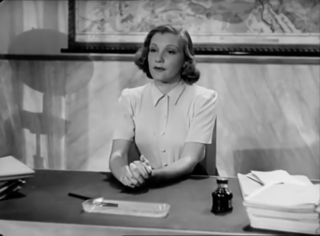
Vera Bergman was a German stage and film actress known for her roles in Italian films. Bergman died in 1971.
Count Max is a 1991 French-Italian comedy film directed by Christian De Sica and starring De Sica, Ornella Muti and Galeazzo Benti. It is a remake of the 1957 film Count Max, which was itself a remake of the 1937 film Il signor Max. Both films had starred Christian De Sica's father Vittorio De Sica.

Two on a Vacation is a 1940 Italian comedy film directed by Carlo Ludovico Bragaglia and starring Vittorio De Sica, María Denis, and Umberto Melnati. It was a remake of the 1932 German film Two in a Car. It was shot at the Cinecittà Studios in Rome.
The Two Mothers is a 1938 Italian drama film directed by Amleto Palermi and starring Vittorio De Sica, María Denis and Renato Cialente.
















